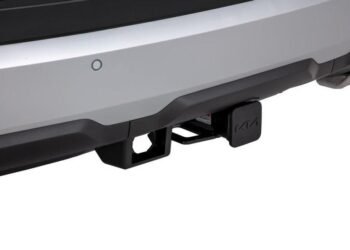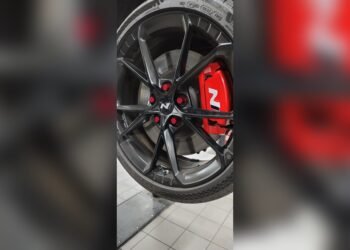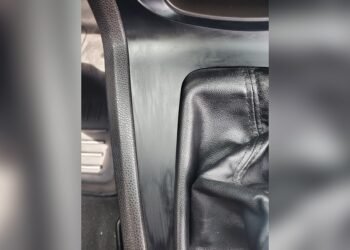If you’ve noticed a rattling noise coming from your Prius when you press the gas pedal, you’re not alone—and it’s something you shouldn’t ignore. That annoying sound can be more than just a minor inconvenience; it might be a sign that something in your car needs attention right away.
Whether it’s coming from the engine, exhaust, or transmission, understanding why your Prius rattles when accelerating can save you from costly repairs down the road. You’ll discover the most common causes of that rattling noise and what steps you can take to fix it, helping you get back on the road with confidence and peace of mind.
Keep reading to find out how to protect your Prius and avoid surprises on your next drive.
Common Exhaust Issues
The exhaust system of a Prius plays a key role in reducing noise and controlling emissions. Common exhaust issues often cause rattling noises during acceleration. These issues can affect your car’s performance and comfort.
Rattling sounds from the exhaust usually come from loose or damaged parts. Checking these components early can save you from costly repairs. Below are the most frequent exhaust problems that cause rattling.
Loose Heat Shields
Heat shields protect the exhaust system from heat damage. Over time, rust or road debris can loosen these shields. When loose, they vibrate and create a rattling noise. This sound often gets louder during acceleration. Tightening or replacing the shields usually fixes the problem quickly.
Damaged Catalytic Converter
The catalytic converter reduces harmful emissions. Inside, it contains fragile materials that can break or become loose. A damaged converter often causes a rattling or buzzing noise. This noise is most noticeable when accelerating. Ignoring this issue can lead to poor engine performance and higher emissions.
Loose Exhaust Components
Exhaust pipes and clamps can loosen over time due to vibration and heat cycles. Loose parts may knock against each other or the car’s frame. This creates a rattling noise, especially when accelerating. Mechanics can inspect and tighten or replace these components to stop the noise.

Credit: www.toyotaownersclub.com
Engine-related Causes
The rattling noise from your Prius during acceleration often points to engine-related causes. These issues affect how the engine runs and can lead to noises that worry any driver. Understanding these causes helps identify the problem early and avoid bigger repairs.
Engine noises usually mean some parts inside are not working smoothly. The engine works harder during acceleration, making any faults louder. Common engine-related causes include engine knock, low or dirty oil, worn mounts, and faulty timing parts.
Engine Knock And Pre-ignition
Engine knock happens when fuel burns unevenly in the cylinders. This creates a sharp rattling noise during acceleration. Pre-ignition is a similar problem where the fuel ignites too early. Both conditions stress the engine and lower performance. Fixing this might need better fuel or engine tuning.
Low Or Dirty Engine Oil
Engine oil keeps parts moving smoothly and cools the engine. Low or dirty oil causes poor lubrication. This makes metal parts rub and create rattling sounds. Regular oil changes and checking oil levels help prevent these noises and engine damage.
Worn Engine Mounts
Engine mounts hold the engine in place and absorb vibrations. When mounts wear out, the engine moves more during acceleration. This movement causes rattling and banging noises. Replacing worn mounts restores smooth engine operation and reduces noise.
Faulty Timing Components
The timing chain or belt controls engine valve movements. If these parts wear or loosen, they can cause a rattling noise. Faulty timing components affect engine timing and performance. Timely inspection and replacement keep the engine quiet and efficient.
Transmission-related Causes
Transmission issues often cause rattling noises during acceleration in a Prius. The transmission system transfers power from the engine to the wheels. Problems here can create unusual sounds that signal trouble. Understanding common transmission-related causes helps you identify and address the issue early.
Low Transmission Fluid
Transmission fluid lubricates moving parts inside the transmission. Low fluid levels cause friction and heat buildup. This friction can produce a rattling or grinding noise. Checking and topping off the fluid can often stop the noise. Using the correct type of fluid is crucial for proper transmission function.
Worn Transmission Mounts
Transmission mounts hold the transmission in place. Over time, these mounts can wear out or crack. Worn mounts allow excessive movement during acceleration. This movement causes rattling noises as parts shift or vibrate. Replacing damaged mounts restores stability and reduces noise.
Failing Torque Converter
The torque converter connects the engine to the transmission. It allows smooth power transfer at different speeds. A failing torque converter can cause rattling sounds when accelerating. This issue often leads to slipping or shuddering during driving. Early diagnosis and repair prevent further damage to the transmission.
Quick Inspection Tips
Rattling noises during acceleration in a Prius can indicate several issues. Quick inspections help find the problem early. These simple checks save time and money. Follow these easy steps to inspect your vehicle.
Checking Exhaust Heat Shields
Heat shields protect the exhaust system from heat damage. Over time, they can loosen or rust. Gently shake the shields to check for movement. Loose shields cause rattling noises when accelerating. Tighten or replace any damaged parts.
Verifying Fluid Levels
Low fluids can cause engine and transmission noises. Check the engine oil, transmission fluid, and coolant levels. Use the dipstick or reservoir marks for accurate readings. Fill any low fluids to the recommended levels. Proper fluids help reduce engine noise and wear.
Assessing Engine Mounts
Engine mounts hold the engine in place. Worn mounts allow extra engine movement. This causes rattling sounds during acceleration. Inspect mounts for cracks or damage. Replace mounts that are broken or loose to stop the noise.
Simple Fixes To Try
Rattling noises in your Prius during acceleration can be annoying and worrying. Many causes exist, but some simple fixes may stop the noise without costly repairs. Trying these steps can save time and money. They help keep your car running smoothly and quietly.
Tightening Loose Components
Loose parts often cause rattling sounds. Check under the hood for any bolts or screws that may be loose. Tighten brackets around the exhaust system, heat shields, and engine mounts. Use a wrench or screwdriver to secure them firmly. This simple step can stop many rattling noises quickly.
Replacing Damaged Parts
Damaged parts can cause noises during acceleration. Look for cracked heat shields or worn engine mounts. Also, check the catalytic converter for any damage. Replace any broken or worn components with new ones. Using genuine or high-quality parts ensures better performance and less noise.
Flushing And Refilling Fluids
Old or low fluids can cause engine noise. Change the engine oil if it looks dirty or smells burnt. Also, flush and refill transmission fluid to keep shifting smooth. Proper fluid levels help lubricate parts, reducing rattling and improving vehicle health.

Credit: www.youtube.com
When To See A Mechanic
Knowing when to see a mechanic for your Prius rattling noise is important. Some sounds mean serious problems. Others might be minor but still need attention. Acting early can save you from costly repairs. Watch for signs that the noise does not stop or gets worse. Pay attention to how your car drives along with the noise. These clues help you decide when to get professional help.
Persistent Rattling Noise
A rattling noise that stays after several drives needs a mechanic’s check. It may signal loose parts or failing components. Ignoring it can lead to bigger damage. A steady rattle under acceleration is not normal. Get the car inspected to find the exact cause.
Unusual Engine Performance
If your Prius feels weak or rough when you press the gas, it is a warning. Engine performance problems often come with rattling. You might notice poor acceleration or stalling. These issues can mean engine knock or low oil. Do not delay a mechanic visit to avoid engine damage.
Transmission Slipping Or Hesitation
Rattling combined with the car slipping gears or hesitating is serious. This can point to transmission trouble or torque converter issues. Transmission problems affect safety and drivability. Have a mechanic check transmission fluid and parts. Early repairs can keep your Prius running smooth and safe.

Credit: www.reddit.com
Frequently Asked Questions
Why Does My Toyota Engine Rattle When Accelerating?
A Toyota engine rattles during acceleration due to low or dirty oil, engine knock, loose exhaust parts, or worn engine mounts. Check oil levels and inspect exhaust heat shields or catalytic converter. Prompt mechanic inspection prevents worsening issues and maintains performance.
Why Is There A Rattling Sound When I Accelerate?
A rattling sound during acceleration often signals loose exhaust parts, engine knock, low oil, worn mounts, or transmission issues. Have a mechanic inspect it promptly to avoid further damage and maintain performance.
Can A Bad Transmission Cause Rattling Noise?
Yes, a bad transmission can cause rattling noise due to low fluid, worn gears, or a failing torque converter.
Why Does My Prius Rattle When Accelerating?
Rattling often comes from loose heat shields, worn engine mounts, or engine knock during acceleration.
Can Low Engine Oil Cause Prius Rattling Noises?
Yes, low or dirty engine oil reduces lubrication, causing engine parts to rattle or knock.
Conclusion
A rattling noise when accelerating your Prius should not be ignored. It may signal issues with the exhaust or engine parts. Addressing the problem early helps avoid costly repairs later. Regular maintenance keeps your car running smoothly and quietly. Stay alert to unusual sounds and get your Prius checked soon.
Driving safely means listening closely to your vehicle’s signals.

















